
Harvey Keitel is an American actor known for his portrayal of morally ambiguous and "tough guy" characters. He rose to prominence during the New Hollywood movement, and has held a long-running association with director Martin Scorsese, starring in six of his films: Who's That Knocking at My Door (1967), Mean Streets (1973), Alice Doesn't Live Here Anymore (1974), Taxi Driver (1976), The Last Temptation of Christ (1988), and The Irishman (2019).
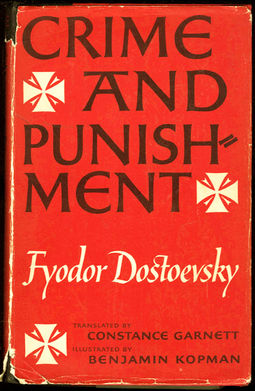
Crime and Punishment is a novel by the Russian author Fyodor Dostoevsky. It was first published in the literary journal The Russian Messenger in twelve monthly installments during 1866. It was later published in a single volume. It is the second of Dostoevsky's full-length novels following his return from ten years of exile in Siberia. Crime and Punishment is considered the first great novel of his mature period of writing and is often cited as one of the greatest works of world literature.

Fairuza Balk is an American actress, musician, and visual artist. Known for her portrayals of distinctive characters—often with a dark edge and "goth-girl" persona—she has appeared in numerous independent films and blockbuster features.
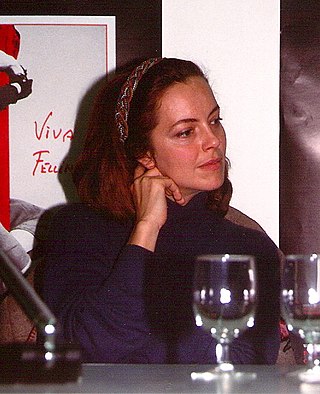
Greta Scacchi, OMRI is an actress known for her roles in the films White Mischief (1987), Presumed Innocent (1990), The Player (1992), Emma (1996) and Looking for Alibrandi (2000).

Randall Brent Woodfield is an American serial killer, serial rapist, kidnapper, robber, burglar and former football player who was dubbed the I-5 Killer or the I-5 Bandit by the media due to the crimes he committed along the Interstate 5 corridor running through Washington, Oregon and California. Before his capture, Woodfield was suspected of multiple sexual assaults and murders. Though convicted in only one murder, he has been linked to a total of 18 murders and is suspected of having killed up to as many as 44 people.

Rising Sun is a 1993 American buddy cop crime thriller film directed by Philip Kaufman, who also wrote the screenplay with Michael Crichton and Michael Backes. The film stars Sean Connery, Wesley Snipes, Harvey Keitel, Tia Carrere, Mako and Cary-Hiroyuki Tagawa. It was based on Michael Crichton's 1992 novel Rising Sun.
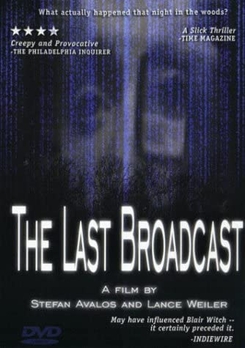
The Last Broadcast is a 1998 American horror film written, produced and directed by Stefan Avalos and Lance Weiler, who also star in the film. Told in a pseudo-documentary format and employing the found-footage technique, the fictional film appears to tell the story of a man convicted in 1995 of murdering the members of his team during an expedition to find the mythic Jersey Devil in the New Jersey Pine Barrens.

They Won't Believe Me is a 1947 American film noir directed by Irving Pichel and starring Robert Young, Susan Hayward and Jane Greer. It was produced by Alfred Hitchcock's longtime assistant and collaborator, Joan Harrison. The film was made and distributed by Hollywood major studio RKO Pictures.

Personal Velocity: Three Portraits is a 2002 American drama film written and directed by Rebecca Miller. It stars Kyra Sedgwick, Parker Posey, and Fairuza Balk as three women who escape from their afflicted lives as each struggle to flee from the men who confine their personal freedom.

My Sexiest Year is a 2007 American romantic comedy drama film starring Frankie Muniz and Harvey Keitel and was written and directed by Howard Himelstein. The film is a romantic coming-of-age story in which the kindness bestowed by a glamorous model is returned 30 years later by the young man in whom she inspired the first stirrings of confidence and love. The film takes place in 1970s Miami and was shot in various locations such as Collins Avenue and Coral Gables Senior High School.
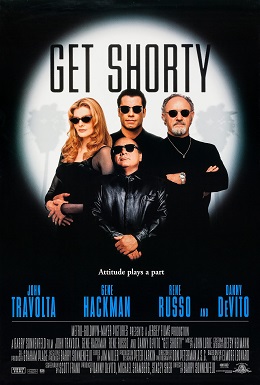
Get Shorty is a 1995 American gangster comedy film directed by Barry Sonnenfeld and written by Scott Frank, based on Elmore Leonard's 1990 novel. The film stars John Travolta, Gene Hackman, Rene Russo, Delroy Lindo, James Gandolfini, Dennis Farina, and Danny DeVito. It follows Chili Palmer (Travolta), a Miami mobster and loan shark who inadvertently gets involved in Hollywood feature film production.
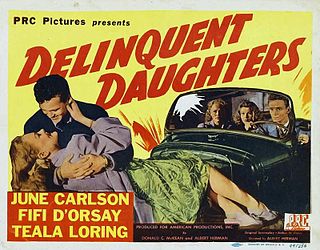
Delinquent Daughters, or Accent on Crime, is a 1944 American drama film directed by Albert Herman and starring June Carlson, Fifi D'Orsay and Margia Dean. An exploitation film, it is about a police investigation into the suicide death of a high school girl and the hard-partying teenagers at a party prior to the incident.

Ripley Under Ground is a 2005 German-British-French crime thriller film directed by Roger Spottiswoode and based on the 1970 second novel in Patricia Highsmith's Tom Ripley series. It stars Barry Pepper as Ripley and features Willem Dafoe, Alan Cumming, and Tom Wilkinson in supporting roles.
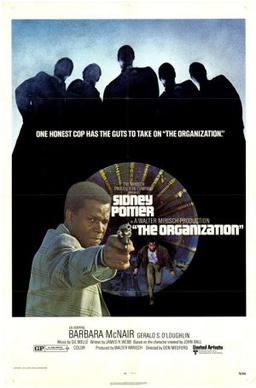
The Organization is a 1971 DeLuxe Color American crime thriller film starring Sidney Poitier and directed by Don Medford. It was the last of the trilogy featuring the police detective Virgil Tibbs that had begun with In the Heat of the Night (1967), followed by They Call Me Mister Tibbs! (1970). In The Organization, Tibbs is called in to hunt down a gang of urban revolutionaries, suspected of a series of crimes. The screenplay was penned by James R. Webb, and the film co-stars Barbara McNair, Gerald S. O'Laughlin, Sheree North and Raul Julia.
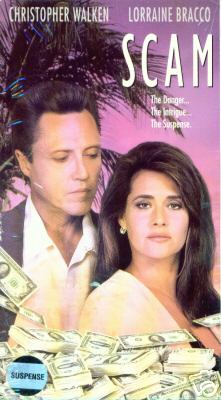
Scam is a 1993 television film adaptation of crime drama novel by Craig Smith titled Ladystinger. It originally aired on Showtime in May 1993.

After Tomorrow is a 1932 American pre-Code drama film directed by Frank Borzage and starring Charles Farrell, Marian Nixon, Minna Gombell, Josephine Hull and William Collier, Sr.
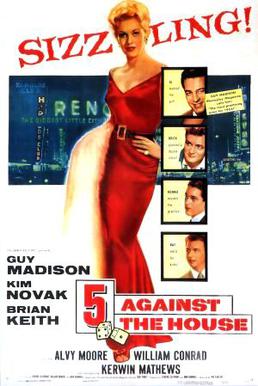
5 Against the House is a 1955 American heist film directed by Phil Karlson and starring Guy Madison, Kim Novak, Brian Keith and William Conrad. The screenplay is based on Jack Finney's 1954 novel of the same name, later serialized by Good Housekeeping magazine. The film centers on a fictional robbery of Harold's Club, a real Reno casino.

Escape Plan is a 2013 American prison action thriller film starring Sylvester Stallone and Arnold Schwarzenegger, and co-starring Jim Caviezel, 50 Cent, Vinnie Jones, Vincent D'Onofrio and Amy Ryan. It was directed by Swedish filmmaker Mikael Håfström, and written by Miles Chapman and Jason Keller. The first film to pair up Stallone and Schwarzenegger as co-leads, it follows Stallone's character Ray Breslin, a lawyer turned prison security tester who is incarcerated in the world's most secret and secure prison, and recruits fellow inmate Emil Rottmayer, portrayed by Schwarzenegger, to stage a breakout. The film is the first installment of the Escape Plan film series.
Strange Bargain is a 1949 American crime mystery starring Martha Scott and Jeffrey Lynn. It is directed by Will Price. Harry Morgan appears in support.
Sheila Caroline Ballantyne was an American novelist and short story writer. Her work primarily focused on the shifting roles of women during first-wave feminism.


















